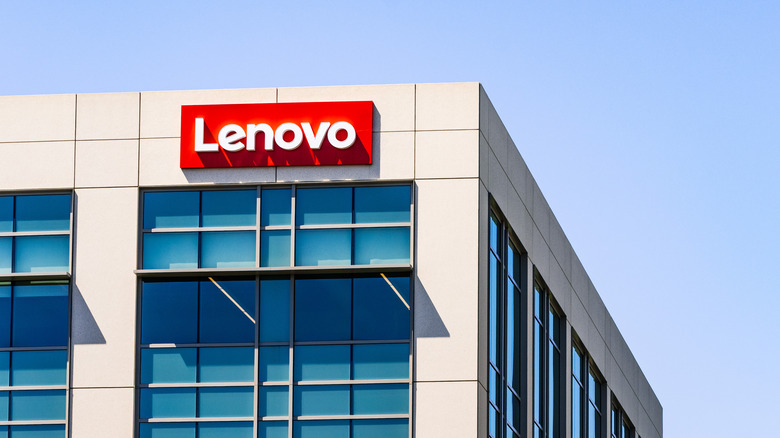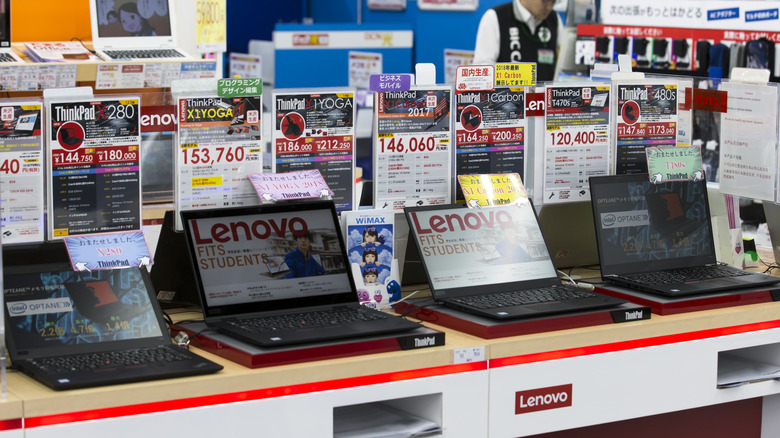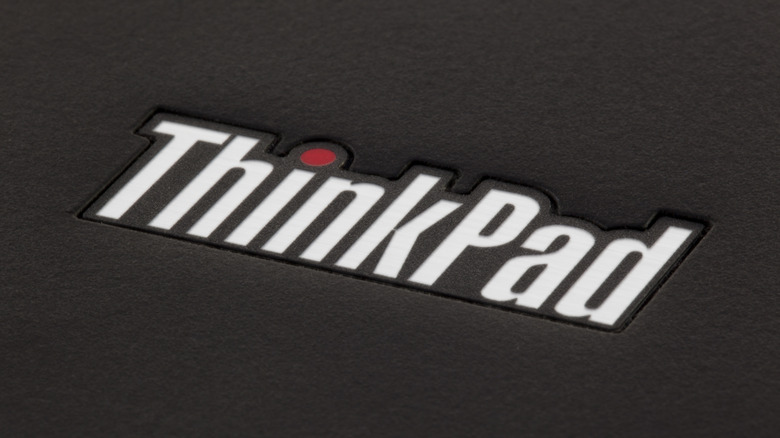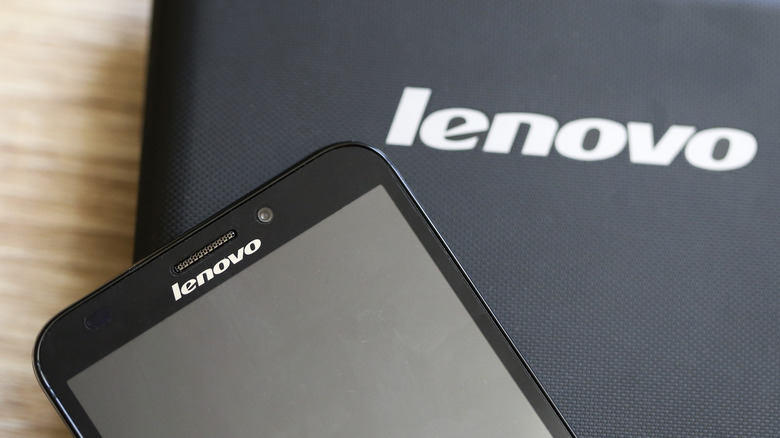Here's Where Lenovo Products Are Made Today
We may receive a commission on purchases made from links.
Founded in November 1984, Lenovo is a multinational tech company with roots in Beijing, China. While it is known as the largest maker of PCs worldwide, Lenovo has diversified its product lines from smart devices and tablets, to mobile phones and TVs. Through the years, Lenovo has become a household name globally, gracing everywhere from our homes to outer space. But, where are Lenovo devices made exactly, and why does it matter?
According to Statista, Lenovo has held the title of the highest market share for PC vendor shipment in the last decade — except in 2017 wherein HP overtook it by 0.2%. In 2023, Lenovo held 24.7% of the global PC vendor shipments, which clocked in at about 59.73 million units. With millions of Lenovo users worldwide, it's unsurprising that some of them might be curious about where their personal or work laptop comes from. After all, the origins of your tech can tell a lot about the ubiquity of its repair parts, possible security risks, and the price increases that could happen eventually.
To retain its seat at the top, Lenovo has worked to establish a strong manufacturing arm with its global supply chain. It has even won an award from Gartner and placed 8th in the 2023 Supply Chain Top 25, which looks at business potential and leadership in the space. So, if you're curious about its origins, here's a look at where Lenovo products are made today.
Lenovo's global manufacturing strategy
In its 2024 Manufacturing Sites and Suppliers list, Lenovo lists its manufacturing sites, outsourced manufacturers, and component suppliers. Among its 11 manufacturing sites, four of them are based in various cities in China, two are in Mexico, and the rest are in Brazil, India, Japan, Hungary, and the United States. With a total of 15,750 employees, Lenovo shares that an estimated 12,100 (77%) of its manufacturing sites' workforce comes from China, followed by Mexico (8%) and Hungary (6%). On the other hand, manufacturing sites in Brazil, India, Japan, and the USA employ around 2% (300-350 employees) each.
Similarly, for its outsourced manufacturers which handle various commodities, the majority are also based in China. Out of its 17 outsourced manufacturing sites,12 (70.59%) are based in China and two (11.76%) are based in Brazil. India, Vietnam, and Argentina all have one listed outsourced manufacturing site each.
As for its components, Lenovo lists over 480 facilities across 263 companies for its suppliers. Among these, 386 (80.4%) are based in various provinces in China. Some notable American suppliers on the list include providers for accessories (3M), software (Dolby, VMWare), server components (Intel, OnSemi, Texas Instruments), and other undisclosed commodities (like AMD). Although, it's important to note that the published list includes only up to 94% of its production spend, so it's possible that other facilities are not included.
Lenovo as a partner in American technology
In 2005, Lenovo acquired influential American computer manufacturer — International Business Machines Corporation (IBM) — and quickly benefitted from the ThinkPad brand. The ThinkPad wasn't just an award-winning product, but it also emerged as a status symbol in the enterprise space. In its early promotions, the ThinkPad was shown to grace workplaces worldwide, including being used by archeologists in Egypt to even space.
Since 2007, Lenovo claims to have been using the United States Department of Defense's Military-STD 810G standards, which are a series of tests meant to evaluate their durability. Tests include exposure to extreme temperature changes for long periods, sand and dust exposure, vibration, humidity, high altitudes, and more.
Not to mention, Lenovo has continued on its path of innovation in various ways. In 2023, it released a slew of new ThinkStation Desktops And ThinkPad Laptops — including one which it claims is the most powerful workstation it has ever released. In the 2024 Mobile World Conference (MWC), Lenovo's transparent laptop concept has even caught the eye of our team.
Unsurprisingly, Lenovo also shared on its website that nearly a thousand American agencies, including state, military, and federal agencies, use Lenovo devices for their enterprise needs. That being said, Lenovo has become a key partner in maintaining American technology infrastructure, from transportation to courtrooms and even businesses.
Why where Lenovo is made matters
Unfortunately, while global supply chains can help knowledge sharing and reduce prices for goods, it does have its risks. Like many other technology manufacturing institutions, Lenovo has also been hit by ongoing global supply issues. In a 2022 interview with Reuters, Luca Rossi, executive vice president of Lenovo, shared that manufacturing shutdowns, inflation, and geopolitical tensions affected their total shipments.
In 2019, Forbes reported how an official cybersecurity review revealed the risks associated with the United States military buying high-risk Chinese technology. While the report cited in the article is no longer available online, as per writing, Forbes claims that it mentioned $33 million worth of equipment purchases from several companies, including Lenovo. This comes three years after the Pentagon issued a warning against Lenovo in 2016, citing detection of unauthorized remote communications.
In recent times, United States House of Representatives member Mike Gallagher has also called for "immediate action" to pull Lenovo products from the Navy Exchange stores. In his 2023 letter to Navy Exchange Service Command CEO Robert Bianchi, Gallagher said "Doing so creates a major cybersecurity threat and undermines the U.S. Department of Defense's 2023 Cyber Strategy, which commits to 'foster[ing] a culture of cybersecurity and cyber awareness.'"
With increasingly advanced cyber warfare tools, there's no doubt that the American government's fears are somewhat valid. Despite this, Lenovo has consistently denied involvement with the suspected Chinese government's espionage, citing that they remain committed to upholding global corporate governance requirements.



